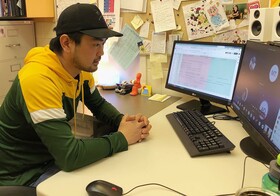LCI band students engaging in online project-based learning

By Garrett Simmons
Communications Officer
Lethbridge School Division
On March 19, band students at Lethbridge Collegiate Institute were set to hit the stage for the school’s annual spring performance.
The COVID-19 pandemic put a stop to that, as schools were officially closed to students on March 16.
Now, students are busy learning from home, and LCI band teacher Samuel Yamamoto is finding creative ways to keep his budding musicians engaged.
Concert band students had put in plenty of in-school preparation, but that has now shifted to learning at home.
“This all happened right before festival season,” said Yamamoto. “Most of these kids have been working on music since January or earlier, and they were all performance ready.”
If all goes according to plan, that hard work will pay off in the form of a video performance.
“I am having them record themselves playing along with a click track,” said Yamamoto, who added those individual performances are being submitted through FlipGrid, an application found within Microsoft Teams. “Hopefully, I’ll get all of their responses and splice them together.”
That digital performance may not be quite the same as a show in front of a packed audience, but if enough students contribute, the video project could be a very unique endeavour.
“I am getting pretty good interest,” said Yamamoto, regarding the project-based learning opportunity.
The LCI band teacher is also holding regular Teams meetings.
“I have really good attendance. The students have a desire to meet and getting them to do the virtual work is the next challenge.”
Yamamoto added Teams meetings, virtual lesson delivery and online project-based learning opportunities are working as intended, but for a teacher, nothing beats being in front of students each day in a traditional setting.
“I realize my whole lifeblood of teaching is being around the kids. I thrive being around the students and learning with them.”
Education for his jazz students in the learning-at-home context is similar to what his concert band students are experiencing.
“I’ve created a resource of all these different projects they can choose to do,” said Yamamoto, who added projects for his Jazz Band students are separated into one, two and three-week-or-longer projects.
Projects range from daily assignments all the way to intensive undertaking such as the creation of a 10-20-minute podcast. Watching a 30-minute performance by a jazz great, performing four jazz scales and improvising a solo are just some of the innovative projects, including more traditional assignments such as essays on the history of jazz.
Yamamoto added one student is arranging a Jazz Band piece, a project which will likely take until the end of the school year.
Students sign up and put their name beside a project on a spreadsheet, as Jazz Band members also have the opportunity to work together.
“I’m all for them to collaborate if they want to work on a project together,” said Yamamoto.
Online project-based learning is also the go-to strategy for Yamamoto’s Guitar students.
“The content is the exact same but the delivery if different,” said Yamamoto, who added students across all musical disciplines are finding things they enjoy about learning at home. “I ask the kids for feedback and by and large, the feedback has been positive.”











